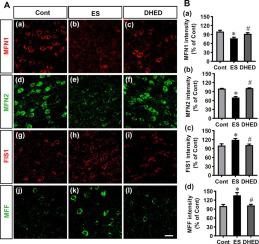Brain Research ( IF 2.7 ) Pub Date : 2021-09-22 , DOI: 10.1016/j.brainres.2021.147665 Guangcong Peng 1 , Huaping Zheng 2 , Chunyi Wu 1 , Chongyun Wu 1 , Xu Ma 1 , Jing Xiong 1 , Jun Hou 1 , Limei Zhang 1 , Luodan Yang 1 , Hongying Pan 1

|
DHED (10β,17β-dihydroxyestra-1,4-dien-3-one) is a brain-selective prodrug of 17β-estradiol and has been reported to have a strong neuroprotective effect. In this study, the exhaustive swimming rat model was used to investigate the therapeutic effects and mechanisms of intranasal DHED treatment. Male eight-week-old healthy Sprague Dawley rats were randomly divided into three groups: control group (Cont), exhaustive swimming (ES), and DHED + exhaustive swimming (DHED). The open-field test and beam-walking test were performed to measure exploratory behavior and general activity in rats. Immunofluorescence staining, western blotting, ELISA analysis and related assay kits were applied to measure brain damage, inflammatory cytokines, and apoptosis pathways. Behavioral data shows that DHED intranasal administration can prevent neurobehavioral impairment caused by exhaustive swimming. Using a series of bioanalytical assays, we demonstrated that DHED markedly abated neuronal injury compared to the exhaustive swimming group, as evidenced by the reduced expression of apoptosis-regulated proteins, the improvement of neural survival, and the prevention of myelin loss. In addition, mitochondrial fission was attenuated distinctly, and a dynamic equilibrium was restored. Intranasal administration of DHED likewise significantly suppressed reactive gliosis and the release of inflammatory cytokines in the rat cerebral motor cortex. Consistent with previous reports, DHED treatment ameliorated changes of excitatory neurotransmitters. These results provide strong support for the promising therapeutic effects of DHED on neuroprotection during exhaustive swimming. The underlying mechanisms may rely on mitochondrial dynamics, neuroinflammation, and the balance of neurotransmitters.
中文翻译:

DHED 鼻内给药可防止大鼠剧烈运动引起的脑损伤
DHED (10β,17β-dihydroxyestra-1,4-dien-3-one) 是 17β-雌二醇的脑选择性前药,据报道具有很强的神经保护作用。本研究采用力竭游泳大鼠模型研究鼻内DHED治疗的疗效和机制。雄性8周龄健康Sprague Dawley大鼠随机分为三组:对照组(Cont)、力竭游泳组(ES)和DHED+力竭游泳组(DHED)。进行旷场测试和光束行走测试以测量大鼠的探索行为和一般活动。应用免疫荧光染色、蛋白质印迹、ELISA 分析和相关检测试剂盒来测量脑损伤、炎性细胞因子和细胞凋亡途径。行为数据表明,DHED 鼻内给药可以预防由力竭游泳引起的神经行为障碍。使用一系列生物分析测定,我们证明与力竭游泳组相比,DHED 显着减轻了神经元损伤,这可以通过细胞凋亡调节蛋白的表达减少、神经存活的改善和髓鞘丢失的预防来证明。此外,线粒体裂变明显减弱,恢复了动态平衡。DHED 的鼻内给药同样显着抑制大鼠大脑运动皮层中的反应性神经胶质增生和炎性细胞因子的释放。与之前的报道一致,DHED 治疗改善了兴奋性神经递质的变化。这些结果为 DHED 在力竭游泳期间对神经保护的有希望的治疗作用提供了强有力的支持。潜在的机制可能依赖于线粒体动力学、神经炎症和神经递质的平衡。











































 京公网安备 11010802027423号
京公网安备 11010802027423号